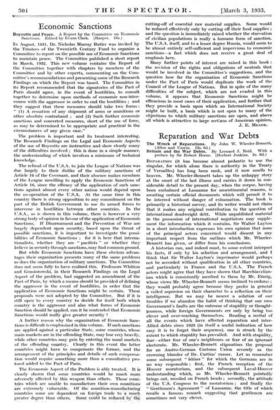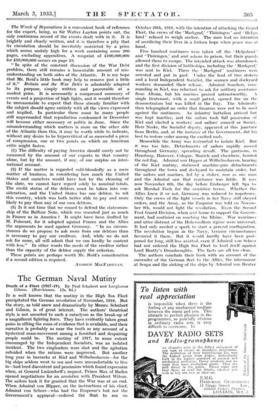Reparation and War Debts
The Wreck of Reparations. By John W. Wheeler-Bennett. (Allen and Unwin. 12s. 6d.)
REPARATION (it has become almost pedantic to use the singular, for which alone there is authority in the Treaty of Versailles) has long been rank, and it now smells to heaven. Mr. Wheeler-Bennett takes up the unhappy story at the onset of the last illness and carries it down in cod- siderable detail to the present day, when the corpse, having been embalmed at Lausanne for unsentimental reasons, is awaiting certain official documents which will permit it to be interred without danger of exhumation. The book is primarily a historical survey, and its writer would not claim that it makes any original contribution to the question of international deadweight debt. While unpublished material in the possession of international negotiators may supple- ment the information which it contains, Sir Walter Layton in a short introduction expresses his own opinion that none of the principal actors concerned would dissent in any important respect from the outlines which Mr. Wheeler- Bennett has given, or differ from his conclusions.
A historian can, and indeed must, to some extent interpret his facts, if only by his selection and arrangement, 'and I think that Sir Walter Layton's imprimatur would perhaps not be accorded without qualification in all other countries, and particularly in France and the U.S.A. The French actors might agree that they have shown that Macchiavelian- ism which is consistently ascribed to them by Mr. Einzig, whose views Mr. Wheeler-Bennett seems inclined to endorse ; they would probably agree because they prefer in general a veiled aspersion on their character to a reflection on their intelligence. But we may be nearer a solution of our troubles if we abandon the habit of thinking that our own Government's faults are the outcome of stupidity or thought- lessness, while foreign Governments err only by being too clever and over-reaching themselves. Reading a recital of all the events which have affected reparation and inter- Allied debts since 1929 (in itself a useful indication of how easy it is to forget their sequence), one is struck by the extent to which stupidity has prevailed. And with stupidity, fear—either fear of one's neighbours or fear of an ignorant electorate. Mr. Wheeler-Bennett stigmatizes the proposal for an Austro-German Customs Union severely as the crowning blunder of Dr. Curtius' career. Let us remember some subsequent " Mises " for which the Germans are in no way responsible : first, the French reception of the Hoover moratorium, and the subsequent Laval-Hoover understanding which, as Mr. Wheeler-Bennett pointedly brings out, recoiled on French heads ; secondly, the attitude of the U.S. Congress to the moratorium ; and finally the " Gentlemen's Agreement " of Lausanne, the title of which recalls a famous remark suggesting that gentlemen are sometimes not very clever. The Wreck of Reparations is a convenient book of reference for the expert, being, as Sir Walter Layton points out, the only continuous record of the events dealt with in it. It is brightly and clearly written, and it is therefore a pity that its circulation should be inevitably restricted by a price which seems unduly high for a work containing some 260 pages, excluding appendices. A misprint of £100,000,000 for £10,000,000 occurs on page 29.
" In spite of the constant discussion of the War Debt problem, there still remains a lamentable amount of mis- understanding on both sides of the Atlantic. It is my hope that Mr. Reid's little book may help to remove just a little of it." Britain and the War Debts is admirably adapted to its purpose, simply written and procurable at a modest price. It is necessarily a compressed summary of events and a projection of high lights, and it would therefore be unreasonable to expect that those already familiar with the subject should agree entirely with all the views expressed and implied. In particular there must be many people still unpersuaded that repudiation condemned in December will become either necessary or politic in June. Since the misunderstanding which matters is more on the other side of the Atlantic than this, it may he worth while to indicate, without any desire to be hypercritical of so successful a piece of compression, one or two points on which an American critic might fasten.
(1) The difficulty of paying America should surely not be measured by the amount of our exports to that country alone, but by the amount, if any, of our surplus on inter- national account.
(2) If the matter is regarded cold-bloodedly as a mere matter of business, in considering how much the United States and ourselves would have lost by the cleaning of the slate, we cannot have regard solely to nominal totals. The credit status of the debtors must be taken into con- sideration, and the United States has one debtor, to wit this country, which was both better able to pay and more likely to pay than any of our own debtors.
(3) Is it not time that we ceased to defend the statesman- ship of the Balfour Note, which was resented just as much in France as in America ? It might have been drafted by M. Poineare, for it adopted against France and the Allies the arguments he used against Germany. " In no circum- stances do we propose to ask more from our debtors than is necessary to pay our creditors. And, while we do not ask for more, all will admit that we can hardly be content with less." In other words the needs of the creditor rather than the capacity of the debtor supply the criterion.
ANDREW MACFADICEAN,



















































 Previous page
Previous page